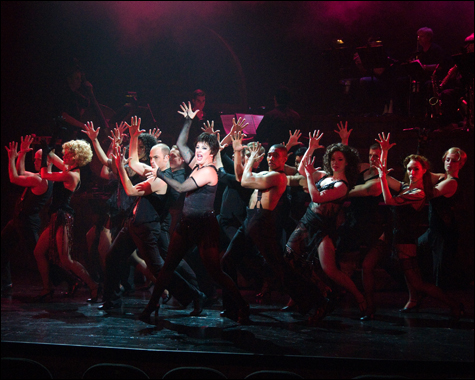
ALL THAT JAZZ Maine State’s Chicago dancers. |
The musical satire Chicago first hit the boards in 1975, the same year as A Chorus Line, and you could say that the two shows highlight two sides of the era's ethos: The latter follows dancers through feel-good, encounter-group-style personal affirmations; the former charts a dancer-murderess in her flashy, cynical rise to celebrity queen. To perhaps oversimplify the themes: While A Chorus Line says, "We're all okay," Chicago says, "We're all going to decadent hell in a tabloid headline." Chicago is probably more accurate and is certainly a lot more fun, and the Maine State Music Theatre's production is lavish enough to implicate us in the love of spectacle that it satirizes. Donna Drake directs the antics of 1920's killer chorus girl Roxie Hart (Erin Maguire) and her rivalry with celebrity murderess vaudevillian Velma Kelly (Nikki Snelson).
The first thing to be said about this production is that it is utterly sumptuous to eye and ear alike. Glitter, fringe, and red plumes abound; the on-stage band is virtuoso; and choreographer Rhonda Miller's ensemble of dancers is mouth-wateringly lithe — even at rest, their louche limbs draped over the bandstand are all sex and Jazz-Age cool. Roxie's scintillating white cocktail dress almost sears the retina, especially when in one white spot Maguire slithers herself supine atop the darkness of the piano.
The show also boasts some marvelous character work. Particularly entertaining is Charis Leos' Matron "Mama" Morton, the bad-ass prison warden who takes bribes from her inmates to network them with the William Morris Agency. Leos' Mama has a massive voice and an understated wryness that plays nicely against the hyper-spectacle of the show. As the charismatic celebrity lawyer Billy Flynn, who represents Roxie and Velma, Curt Dale Clark is smarmily charming, though I hankered for little more darkness in his comedy.
As the lead rivals, Maguire and Snelson are veritable forces. Both have strong voices and comic energy, as well as a great snarky rapport. They also dance to beat the band, and present a striking physical contrast between the older and younger show-girl killers: Snelson's Velma is robustly curvy, while Maguire's upstart Roxie is taller and whip-thin.
Their characterizations are less distinct — this Roxie and Velma are competing incarnations of slapstick comic avarice in heels, and they do it with plenty of sass and tantrum. Their similarity made me recall a Chicago I reviewed last year, at Legacy Theater, and its different approach to the divas: While MSMT's Roxie has a Lucille Ball-ish comic shrillness, Legacy's had the grace of an ingénue — caginess came easily to that Roxie. The characterization made for a nice contrast between the generations — the struggling, old-guard Velma and the effortless, up-and-coming Roxie — and also seemed to imply something larger about our culture itself: That the longer we're saturated with the spectacles of media and celebrity, the more it becomes second nature to manipulate them.